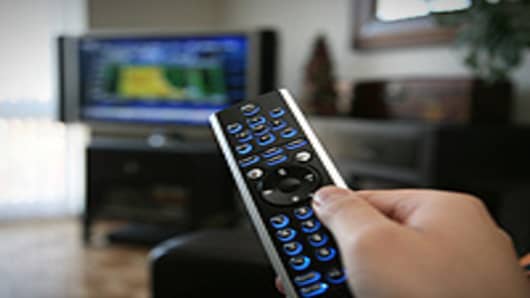Wednesday afternoon Viacom and DirecTV started negotiating again, after a stand-off between the two companies over fees resulted in the biggest cable blackout yet.
DirecTV’s roughly 20 million subscribers have lost access to Viacom’s 26 channels, including Nickelodeon and MTV, as of midnight eastern Wednesday morning.
Productive talks may have started up again, but Viacom has made the bold move of temporarily removing some of its online offerings — like the popular “Daily Show” from Comedy Central and MTV’s “Jersey Shore.” The idea is to prevent DirecTV from sending its subscribers to find shows online during the blackout. The message: Viacom is willing to frustrate subscribers of other cable and satellite TV services while this battle wages on.
The standoff hasn’t been good for either company — DirecTV shares ended the day down 1.1 percent while Viacom stock was off 1 percent. And the longer the outage lasts, the more likely it is that subscribers think about switching providers or even about cutting the cord in favor of online-only options.
On Wednesday, Viacom CEO Philippe Dauman sent a letter to employees, noting that Viacom accounts for 20 percent of DirecTV viewing but less than 5 percent of its programming expenses. And as he pointed out to CNBC, other companies have agreed to higher fees — in the past seven years since the last DirecTV negotiation, Viacom has “successfully and peacefully concluded affiliate agreements with every single other distributor in the United States."
Meanwhile, DirecTV CEO Mike White stresses that he’s willing to pay more — saying he offered double-digit rate increases, which Viacom rejected. He points out that content costs have been rising two times more than what the company has passed along to customers.
What about the idea of “unbundling” Viacom’s 26 cable channels? The content provider says it’s willing to sell DirecTV channels individually, but will offer lower prices if they’re purchased as a bundle. DirecTV says Viacom isn’t offering “a la carte rates,” making that option impossible.
Why does this battle matter? Morgan Stanley analyst Ben Swinburne notes that on a per-subscriber basis, even the largest distributors — Comcast and DirecTV are seeing nearly 10 percent cost growth, and the inability to pass on these growing costs to their customers has pressured margins. Swinburne says this negotiation could be a “watershed event,” indicating the bargaining power of all non-sports networks. (In this industry ESPN reigns king, drawing the highest fees of any network by far.)
- By CNBC's Julia Boorstin
@JBoorstin
Questions? Comments? MediaMoney@cnbc.com



